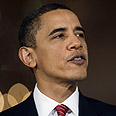
Obama. Led historic revolution
צילום: AFP
Yes, he can
After healthcare revolution, Obama seeking significant Mideast achievement
When Prime Minister Benjamin Netanyahu enters the White House, he will not find there a person who in recent months was characterized in Israel as a naïve rookie and a weak president with great rhetorical skill yet lacking in execution ability.
Barack Obama will be shaking Netanyahu’s hand only a day after managing to lead a historic revolution in the United States and passing the healthcare reform. The American president possesses impressive political skills, or else he wouldn’t make it all this way. However, he is also a president possessing a structured ideology premised on a clear worldview.
According to Obama’s worldview, there can be no reality where some American citizens enjoy the perks of an upscale and highly developed healthcare system, while other citizens are thrown out of the emergency room because they don’t have enough money to purchase an insurance policy. Similarly, he believes that a world premised on human dignity cannot have some people who are occupiers and others who are occupied.
In the fight for the healthcare reform, Obama proved that he is willing to risk everything and gamble with the skill of a talented poker player, as long as he can achieve what he believes in more than anything else. He will now be channeling this determination to the Middle East.
Obama was set to reiterate to Netanyahu his commitment, on behalf of the US, to Israel’s security, yet at the same time was also prepared to make it clear to him, in a decisive and polite tone, that the moment of truth has arrived and demand that the Israeli PM shift gears and move from the speaking phase to the execution stage.
Persistence and determination
In the wake of the public reprimands, and after the rift and reconciliation between Jerusalem and Washington, Obama was set to demand that Netanyahu immediately embark on proximity talks, to be followed by direct negotiations that would lead to the two-state solution during the president’s term in office.
The first question up for discussion for Obama is the borders issue, in order to circumvent the end of the settlement construction freeze; that way, each side will know immediately what belongs to it and what belongs to its neighbor.
On Monday, when Secretary of State Hillary Clinton delivered her address at the AIPAC Conference, she plainly represented the president’s position. Clinton made it clear that the US wishes to secure the following: A Palestinian state in line with the 1967 borders with territorial tradeoffs. She also hinted to agreed-upon international administration of holy sites in Jerusalem, which will serve as the capital of both states.
President Obama has not yet presented his peace plan with a timetable. His advisors recommended that he put this is off to a later stage, after the sides embark on their dialogue, as not to create the impression of American coercion.
Obama will not be referring to his statements in the meeting with Netanyahu as “an American plan,” yet he will present its principles. After etching his name into the pages of history with the healthcare revolution, he intends to show a significant achievement in the Middle East as well. In order to achieve it, he will make use of what helped him more than anything as of late: Persistence and determination. He has proven that, yes, he can.










